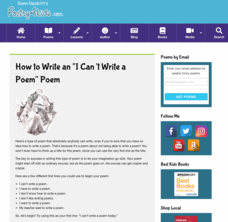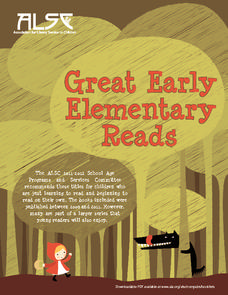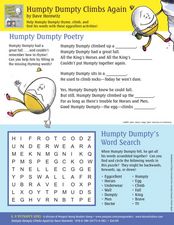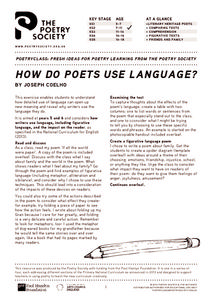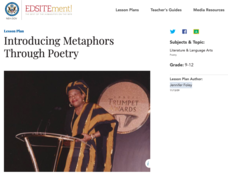Macmillan Education
Understanding Poetry (Elementary)
Introduce young readers to poetry analysis with a learning exercise that uses Emily Bronte's "Spellbound" to model how poets use word choice, the sounds of words, the repetition of words, and rhyming patterns to create the mood, tone,...
Newspaper in Education
The Iliad: A Young Reader Adventure
Is The Iliad part of your curriculum? Check out a resource that offers something for those new to teaching the classic and those with lots of experience using Homer's epic. Plot summaries, discussion questions, activities abound in this...
Curated OER
Maniac Magee: Found Poem
Instruct your readers to scrounge through the pages of Maniac Magee in search for descriptive passages or words they may use to write poetry. As they look for meaningful, sensory descriptors in Jerry Spinelli's novel, readers connect to...
Kansas Poets
Persona Poem
Young poets are asked to craft a poem in the voice of a first person narrator, a dramatic monologue of sorts, that reveals not only a dramatic situation but something of the narrator's character as well.
Geography 360°
Poetry Writing
Put the tips and tricks in this guide into practice in order to encourage your pupils to blossom into poets. A wonderful reference material for teachers, this packet includes definitions of poetic terms and forms as well as step-by-step...
Curated OER
Joyful Noise: Poems for Two Voices by Paul Fleischman
Do your young readers know that poems can be performed as a team? They listen to a few examples from Paul Fleischman's book Joyful Noise: Poems for Two Voices, paying attention to how the how readers work together. They examine the...
Curated OER
Poetry for the Elementary Classroom
Use Shel Silverstein's poem "Batty" to introduce poetry to young readers. This lesson is not formatted well, but the plan does suggest learners memorize a poem, recite the poem individually, and then recite the poem as a class. Poetry...
National Council of Teachers of English
Writing Poetry with Rebus and Rhyme
Young scholars write rhyming poems using rebus. With pictures instead of words, authors create original work about things they love.
Curated OER
A House is a House for Me: Library Skills for Young Readers
Read Mary Ann Hoberman's book A House is a House for Me to introduce the idea that a library is a house for shelves of books. Young readers practice alphabetizing in the picture book (easy fiction) section of the library. They learn how...
Poetry4kids
How to Write an “I Can’t Write a Poem” Poem
Ever have students complain that they don't know how to write a poem? Turn those complaints into magnificent works of writing with an independent poetry lesson about not being able to write poetry.
Curated OER
Comparing Poems
Young literary analysts compare two poems by the same author. Readers look for slant rhyme, observe the beat and rhythm of each, and search for repeated vowel sounds. After re-reading, they observe the lack of punctuation and the stanza...
Curated OER
Nonsense Knows
For this poetry lesson, young readers discuss that poems can sometimes have silly words and made up people, places, and things. Students read and listen to silly poems then write a response poem to their favorite.
Academy of American Poets
Teach This Poem: "A Place in the Country" by Toi Derricotte
Build young scholars' confidence in analyzing art and poetry with a lesson plan that first asks pupils to list details they notice in Edouard Vuillard's painting "Garden at Vaucresson" and then to describe how the painting makes them...
K12 Reader
Literature About Chicago: Prose vs. Poetry
For this comprehension exercise, readers compare Carl Sandburg's "Chicago" to a description of the city from Upton's Sinclair's The Jungle.
Soft Schools
Practice Reading Poetry
Identify the rhyme scheme in a learning exercise that features "Mary Had a Little Lamb." Readers use the nursery rhyme to reinforce poetic elements in four comprehension questions.
American Library Association
Great Early Elementary Reads
Here is an excellent reference list of over 60 recommended book titles for early readers, each of which includes the author, title, number of pages, and brief summary.
Curated OER
School-Home Links/Book Links
Get youngsters reading at home and their parents involved with this at home reading assignment. This resource consists of a ready-to-use handout for documenting at-home reading. Formatted as a letter home to parents, this activity calls...
Curated OER
Humpty Dumpty Poetry
In this Humpty Dumpty worksheet, students complete a poem, word search, and maze revolving around the poem Humpty Dumpty. Students complete 3 activities.
Poetry Society
How do Poets Use Language?
Why do writers choose the language they do? Here's a resource that has the poet himself answer that very question. Joseph Coelho explains why he chose the words and images he used in his poem, "If All the World Were Paper."
Academy of American Poets
Teach This Poem: "Old South Meeting House" by January Gill O'Neil
The vaulted ceiling of the Old South Meeting House has heard many voices. Young scholars read an excerpt about its importance in American history and then do a close reading January Gill O'Neil's poem, "Old South Meeting House." After...
National Endowment for the Humanities
Introducing Metaphors Through Poetry
Metaphors are word pictures, creating images in our brains that draw readers to consider how two seemingly unrelated items are alike. Poems by Langston Hughes, Margaret Atwood, and Naomi Shihad Nye provide learners with an opportunity to...
Curated OER
Bucket List Poetry
What is on your pupils' "Bucket Lists" - the list of things they want to do before they die? Their choices of activities for this list could be very revealing, and is a great source of inspiration for a personal poem. The lesson prompts...
NWT Literacy Council
Readers Theatre Scripts
Engage and entertain young learners with this collection of readers theatre activities. With over 25 different scripts, a wide range of topics are covered from simple counting and rhyming exercises to adaptions of popular children's...
Soft Schools
Practice with Poetry
William Shakespeare's Sonnet 138 is the focus of a reading comprehension exercise that asks readers to answer to five questions using evidence drawn from the poem to support their response.











